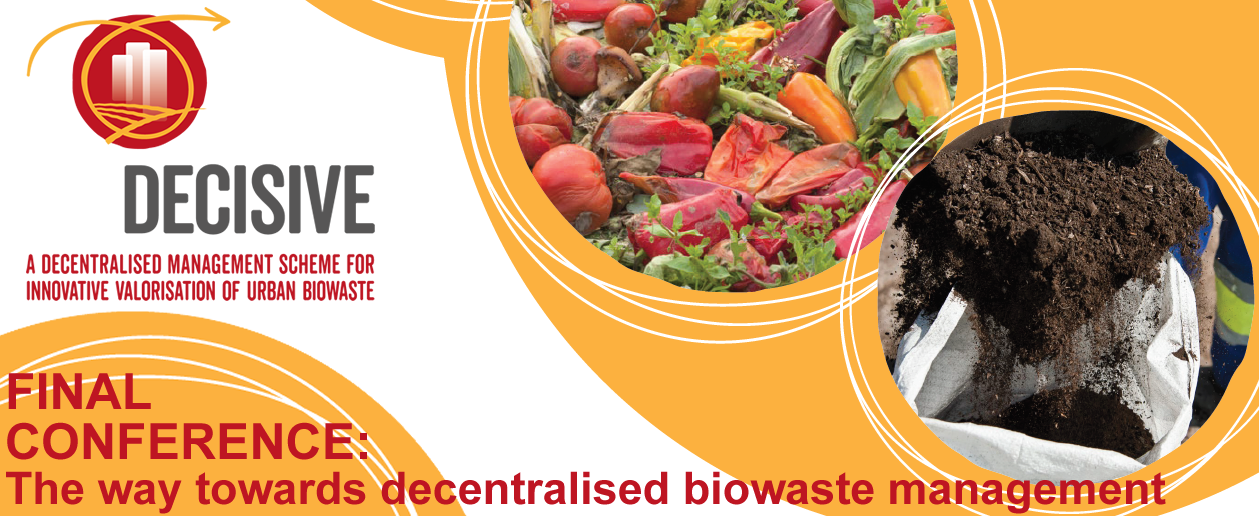The project’s Final Conference which managed to turn the previous five years of the project into a 4-hours long story telling event took part on 20 October and attracted the attention of a very diverse audience.
Hosted online by ACR+, the 110 registered participants had the opportunity to look back at the five years of the project through the presentations and stories from project partners responsible for various stages of the project and inputs that made this project happen. The participants were welcomed by Anne Tremier of INRAE, who acted as the project coordinator and who looked back at the main motivations for proposing such a project to the European Commission’s Horizon 2020 programme back in 2016. The official opening of this Final Conference was done by Iain Gulland, the president of ACR+ and director of Zero Waste Scotland who praised the project consortium’s sense of innovation and perseverance for proving these innovative approaches to be successful. He contributed to the Conference with his reflection on the Scottish reality and the need for finding innovative solutions in rural areas and islands which could rely on decentralised schemes, to cut down collection and transport costs among other benefits.
An unprecedented full-scale test in a dense urban area
After three years of assessing local biowaste flows and research into the most appropriate technology for their recovery, a pilot demonstration site was set up in Ecully in the greater Lyon region in November 2019. The micro-AD unit, built by a French-Chinese company and surmounted by a solar panel, was designed to recycle a minimum of 50 tonnes of biowaste per year – or about one tonne per week – to close the nutrient loop. It was designed to produce biogas, 80% of which was used to heat the unit and provide hot water needed for purifying, and 20% of which was used to generate electricity for an urban farm. This unprecedented pilot site in a dense urban setting was planned to be fuelled mainly by biowaste from the restaurant and catering sector such as collective catering, traditional restaurants, and waste from neighbouring retail premises.
The concept of decentralised schemes tested and showed what needed to be improved
From a technological point of view, the installation of a micro-AD unit in a dense urban space has proved efficient, even attracting new players. The organisation of a short circuit of recycled organic material also ultimately demonstrates the potential for creating jobs. The technology, which can easily be replicated, has also proven to be adaptable since it can be transported as needed. Nonetheless, it allows a progressive implementation of treatment capacities. The micro-AD unit at Ecully is now set up in Narbonne, and a new site in Italy capable of treating up to 200 tonnes of waste per year is currently being installed in a mountainous zone.
A study carried out by the Technical University of Hamburg is looking into how dedicated people are to sorting biowaste in their homes. The results of this sociological study in households of varying socio-economic profiles will help fine-tune policies related to managing waste at the source.
External speakers agree and confirm DECISIVE’s potential
Policy officers from the European Associations of biomass, biogas and composting, as well as Brussels Environment and ENWISE, the technology provider for the Lyon demonstration site joined the Conference as external panellists and reflected on challenges and limitation their industries and organisations are facing. It was agreed that decentralised systems need specific regulations, and the current framework conditions do not really value the positive environmental outcomes of such circular biowaste system. What was highlighted during the panel discussions and agreed between panellists was that food waste must be recovered, with priority given to the prevention of food losses.
Find the Final Conference recording here.
The Idea
Functional separate biowaste collection; Ina Koerner, Steffen Walk, Technical University of Hamburg
Micro Anaerobic Digestion and Solid State Fermentation as the drivers towards biowaste valorisation; Anne Tremier, INRAE, Oscar Prado, AERIS
Allowing local and regional authorities to assess their biowaste collection and treatment schemes; Rosaria Chifari, Fundacio ENT
The Reality
Collecting and valorising biowaste from major producers; Axelle Degueurce, INRAE
Separate collection and its challenges; Teresa Guerrero, Catalan Waste Agency
Collecting quality biowaste from households; Alberto Piani, A&T 2000
The Outlook
Policy recommendations (panel discussion); moderated by Anne Tremier, INRAE
- Marianne Thomsen, Aarhus University
- Giulio Poggiaroni, European Biomass Industry Association
- Marco Giacomazzi, European Biogas Association/European Compost Network
Business uptake and replication; moderated by Jean-Benoit Bel, ACR+
- Pablo Kroff, SUEZ
- Claudio Fontana, ITS Energy
- Paul-Edouard Koeltz and Stephane Vernede, ENWISE
- Nicolas Scherrier, Brussels Environment

